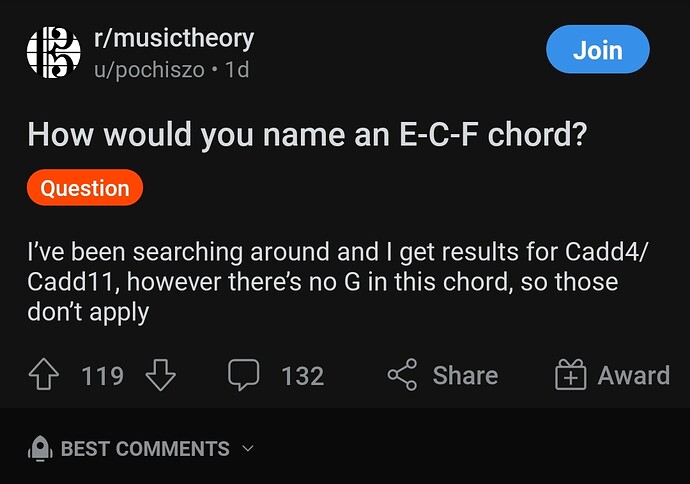So I have kind of a fundamental question for @Old_WannaBe and others having a hard time understanding music theory: Why are you learning music theory?
There’s a smallish amount of theory that is absolutely critical to know eventually. Josh covers a lot of that in the course, actually. Probably almost all of it. Beyond that, there’s a really large amount of rather esoteric music theory that is really only useful for a few things, like:
- You want to analyze music to deeply understand it and why the artist made certain choices
- You want to compose your own music
- You want to understand why some parts of music are constructed like they are
In other words, It’s useful to know to solve specific problems. When not applied to one of those (or similar specific goals/problems), music theory is actually rather useless knowledge.
What I am getting at here is that if you are doing something that requires a bit more theory than you have to either understand it or produce the results you want with it, then studying some theory around it to apply it to that task is a great plan.
But if you aren’t going to apply it to anything then there’s a lot of stuff that you are going to have a hard time with until you have a tangible thing to apply it to. A lot of music theory is around context, and that context is usually about how something sounds.
The thing @sshoihet and I were just discussing is a good real-world example here - seventh chords. When initially learning theory, you get to understand the major scale, minor scale, and chord progressions in them - with the chord nearly always used being the major or minor triad. All notes in the scale. You’ll also learn power chords - just the root and the fifth, denoted with a 5, like C5 for the C power chord (always C and G, regardless of if you are in Cmaj or Cm).
So eventually you learn about seventh chords. These are written as a superscipted 7, like C7 (if that 7 were superscripted). You would probably think that these are a major triad with the 7th added, like C, E, G, B. That’s not correct, though; C, E, G ,B is the C Major 7th chord, notated CM7. The default seventh chord is not the major 7th chord; it’s the dominant seventh, and so the C7 chord is C, E, G, and Bb. Now, B flat is not in the C major scale. If you’re like me, this will break your brain. There’s two reasons this is why this is the case:
- It sounds good and is more musically useful than the Major 7th for building tension before resolving
- A common way chords are actually constructed is by stacking thirds, and once you understand stacked thirds as the basis for most chords, a whole lot of stuff makes more sense
In this case, the bit of music theory there (stacking thirds to make chords) was sort of an interesting fact for me on its own, but when used to understand a huge WTF like “why is there a B Flat in this otherwise C major scale chord?” it becomes super useful to learn - “so a dominant 7th chord is a major triad (a major third plus a minor third) plus another minor third? Got it.”
But until then (or one of its other similar usages), it was just a kind of esoteric bit of theory for me.
So this is all a rather long post to get to the point I wanted to make: I think you’ll get a lot more out of some music theory if it is stuff you are learning specifically to apply to something you are having a tough time understanding. And conversely, if you don’t have a thing to apply it to, there’s a lot that is going to be really mindbending until you try and map it to a real-world problem.
![]() I’ve always approached learning in a similar fashion. If you want to learn how something works you play with it, you take it apart, you see what it’s made of… you don’t look in a book
I’ve always approached learning in a similar fashion. If you want to learn how something works you play with it, you take it apart, you see what it’s made of… you don’t look in a book ![]() If you approach learning that way, you can learn anything and solve virtually any problem
If you approach learning that way, you can learn anything and solve virtually any problem ![]()



